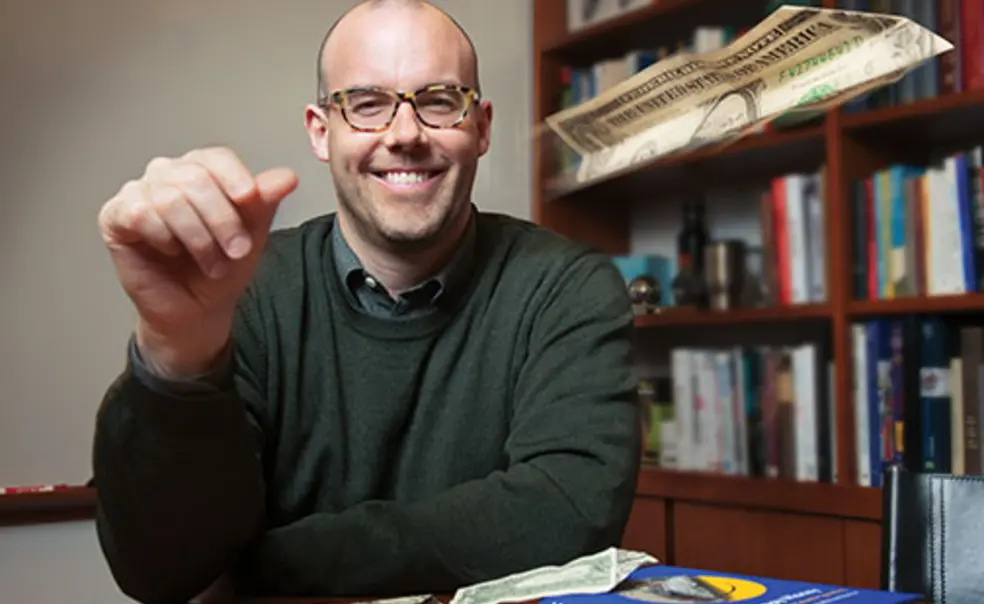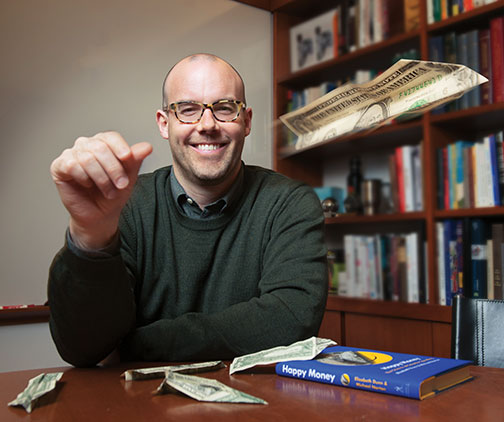Michael Norton *02: Want to Smile More?
Give your money away, build your own table, and make chocolate a ritual
Research has shown that more money leads to only slightly more satisfaction with life. “It doesn’t have as big an impact as we sometimes think,” says Michael Norton *02. “Is that because it can’t? Or is it because of the way we use it?” Norton, an associate professor at Harvard Business School who earned a doctorate in psychology at Princeton, recently has been exploring how people can derive more happiness from their money. How to find happiness is an engine motivating his work, which suggests practical ways for people to improve their daily lives.
In the 2013 book Happy Money: The Science of Smarter Spending, Norton and his co-author, psychologist Elizabeth Dunn, laid out a set of financial-happiness principles, such as spending money on others. In studies conducted in colleges and offices, experimenters gave subjects money to spend within a fixed period of time. Some were told to spend it on themselves, and some to spend it on others. Surveying the subjects later, Norton and his colleagues found that the givers were happier. “It’s not that spending money on yourself is bad,” he says. “It just doesn’t do anything for you.”
At the business school, Norton applies these insights to companies, finding ways to design marketing programs so that customers will be happier with a company’s products and services. In an experiment with Crate & Barrel, some previous customers were mailed coupons, and others got a gift card for a website collecting donations for classrooms in need — DonorsChoose.org. Norton found that the DonorsChoose.org group not only returned to Crate & Barrel’s website slightly sooner than the other group, but also that they gave the company much higher marks when surveyed on statements like “Crate & Barrel is a company that reflects my values.”
Norton dubbed another area of study the “Ikea effect.” He has found that people value the fruits of their own labor — even when that means merely putting together some-assembly-required furniture — more highly than things that come ready to use. “People have horrible artwork in their houses that they made themselves, and they thought it was amazing,” he says, “[but it’s] very, very meaningful to them.” Encouraging people to invest their own labor pays off in happiness.
Ritual, he discovered, also has its rewards. In one study, half the participants were given a chocolate bar to eat however they liked. The other half were told to unwrap the bar and break it in a ritualized way. The ritualists reported that the chocolate tasted better, and they savored it for a longer time. The effect persisted even when the chocolate was replaced with carrots.
Norton’s work over the years has been wide-ranging. While much of his recent work has centered on ways to improve daily life, he also investigates wealth and income inequality.
“Some people criticize social science and say that we observe what’s wrong and merely talk about it,” he says. But it doesn’t have to stop there. The work on daily-life interventions that he and his colleagues are doing is “interesting in its own right, but it has direct practical implications,” he says. “It’s also super-fun.”













No responses yet